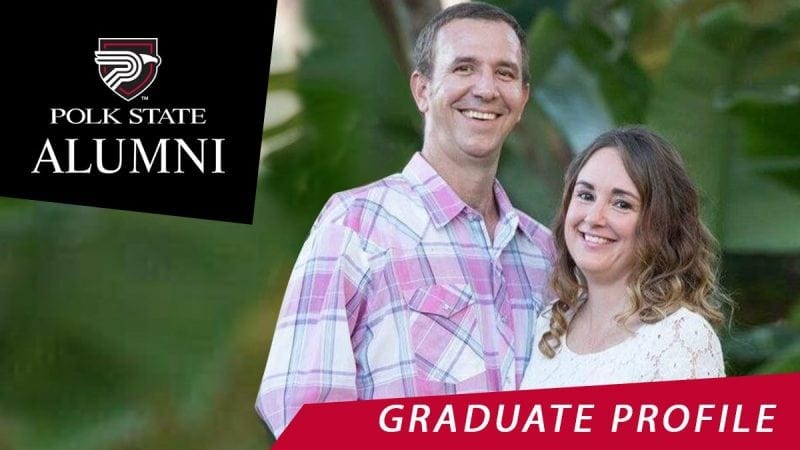Alum, WNCC EMS Program Director Graham Judd: Polk State’s program serves as exemplary model

Polk State College alum Graham Judd says Emergency Medical Services (EMS) Program Director Don Guillette runs a tight ship, which Judd admits he didn’t fully understand when he was a student.
But after more than 10 years in the EMS field, and as the newly appointed director of Western Nebraska Community College’s EMS Program, “I now have a deep appreciation for why things are done the way they are done,” Judd said.
“I have an exemplary role model in Don Guillette, and an exemplary model in Polk State’s EMS Program,” he added. “If I can achieve even a small percentage of what Polk State’s EMS Program has accomplished, I will be happy.”
Judd earned his Emergency Medical Technician (EMT) certification in 2008 and his paramedic license in 2009. He also received a Polk State Associate in Science in EMS degree.
“I have an exemplary role model in Don Guillette, and an exemplary model in Polk State’s EMS Program. If I can achieve even a small percentage of what Polk State’s EMS Program has accomplished, I will be happy.”
Before college, however, he never thought about working in the EMS field until his dad, Polk County Sheriff Grady Judd, suggested he become a volunteer firefighter.
“I guess you could say, in a way, I followed in my father’s footsteps,” Judd said of pursuing a career in public safety.
He learned that he would need hundreds of hours of schooling to become a volunteer, but once he enrolled at Polk State, he developed a special interest in patient care.
He recalls the moment he became certain that he had found his calling. He was heading home after a Starbuck’s study session in Lakeland when he passed a vehicle-bicyclist crash on the road.
“I was still really green in the program – I only knew how to check a pulse – but I stopped to help,” Judd explained. “I quickly knew I was in over my head, but the experience showed me that this is what I wanted to do. I was fascinated with how the first responders knew exactly what to do without hesitation.”
Judd went on to work as an EMT for Polk County EMS for five years.
He left the department in 2013 to pursue a successful pressure-washing business he started as a side job, but quickly realized that he could not stay away from his life-saving tendencies, no matter how much money he was making.
“Things kept happening in front of me,” he said. “I helped a man who got hit by a car; a woman who was T-boned in the Publix parking lot. I started to think that I was doing a disservice by not employing my skills as a paramedic.”
In 2015, he went back to work on an ambulance in Sumter County.
“I took a huge pay cut, but I was happy to serve the community again,” Judd exclaimed.
And he had already made plans to go back to school.
“I’m great on the ambulance as a paramedic – I have the skills, but I knew I needed the degree to back all of that up,” he said. “I was already using my knowledge to help people, but I knew that I needed a degree to move up in the EMS field and to have the capacity to provide care for more people.”
Judd received a Bachelor of Science in Organizational Leadership from Southeastern University, where he is currently pursuing a Master of Business Administration in Healthcare Administration with the program’s first cohort.
Although Judd once worked as a substitute teacher in Lakeland, homeschooled his children at times, and received the 2010 Preceptor of the Year award from the Fortis Institute, he never thought his career would lead him to a position in higher education.
He was an EMS supervisor with American Medical Response and serving as a paramedic in Chattanooga, Tennessee, before moving to Scottsbluff, Nebraska. His wife, Misty, who also received her EMT certification from Polk State in 2008, and four of their six children will join Judd in Nebraska this summer. Their two oldest children will attend college in Tennessee.
“It’s just one of those God things,” Judd said of assuming his position at Western Nebraska Community College.
“I was looking to move up in EMS operations, and this opportunity presented itself,” he explained. “There is a high demand for EMS in this region, with our program providing the only training for 200 square miles and serving residents from 14 counties, totaling nearly 10,000 square miles.”
“I am grateful for the foundation I received as a student of Polk State’s EMS Program. I saw firsthand what it takes to be a first responder, I gained lifelong mentors, and I have an exemplary program to reference as we work to build our program at Western Nebraska Community College.”
Judd’s first goals for the program include earning national accreditation status, building community partnerships, and forming an EMS advisory committee.
“Polk State EMS is a model program in the state of Florida, and our program will be the model program in the state of Nebraska,” he said.
He credits Guillette and Coordinator of Clinical Education Frank Dunn for “setting high standards and establishing benchmarks for a successful EMS program,” Judd said.
He also thanked his former instructors, Kozette Hubbard, Ramon Chico, and Raf Vittone, for contributing to his success.
“I am grateful for the foundation I received as a student of Polk State’s EMS Program,” he added. “I saw firsthand what it takes to be a first responder, I gained lifelong mentors, and I have an exemplary program to reference as we work to build our program at Western Nebraska Community College.”

